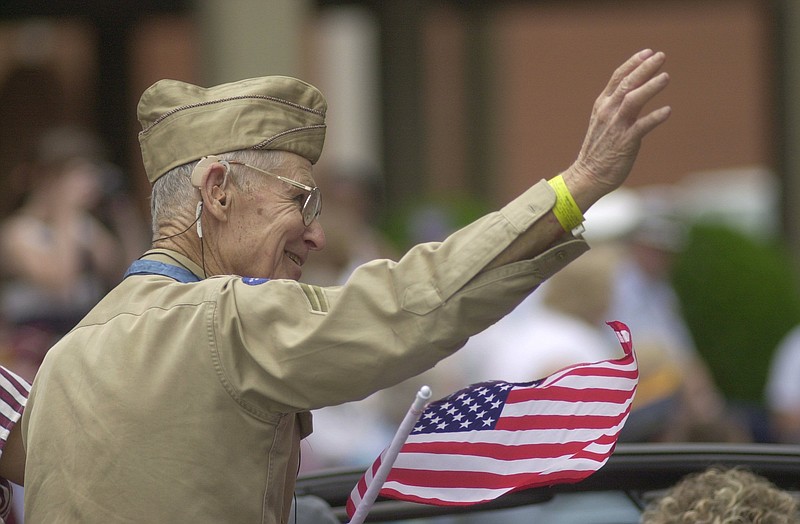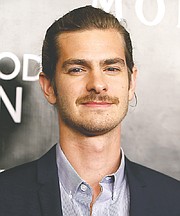Andrew Garfield entered the Chattanooga National Cemetery recently, stepping as close as he could to the man he will try to become.
The actor visited the grave of Desmond Doss, the first conscientious objector to receive the Medal of Honor.
Doss, who lived much of his life in Rising Fawn, Ga., refused to carry a gun during World War II, his religious convictions weighing too heavily upon him. Instead, he became an Army medic. And during a battle in Okinawa, as Japanese fighters aimed at an uncovered, unarmed man for 12 hours, Doss saved 75 wounded Americans.
He returned home a national hero and retired to a quiet life in a small house on Lookout Mountain. Harry Truman called him "the little skinny pharmacist's mate," the only conscientious objector he knew who was "on the level."
But after the war, Doss was guarded about who could tell his story. "True Comics" featured him in an April 1946 edition, and he appeared in an episode of "This Is Your Life" in 1959. He also allowed for a biography in 1967, called "The Unlikeliest Hero."
For the most part, however, he shooed away offers to make himself a character in popular culture. Family and friends say he turned down several offers to see his likeness in movie theaters. He was a devout Seventh-day Adventist and feared the movie would idolize him.
He wanted his story told straight, wanted people to see a soft-spoken man from Lynchburg, Va., whose mother taught him the Ten Commandments and whose father drank too much. He feared a Hollywood cast would turn him into a superhero.
Photo Gallery
Back to Life: After years of reluctance and a hero's burial, Desmond Doss is coming to the big screens
But later this month, when filming of "Hacksaw Ridge" begins in New South Wales, Australia, that exact type of cast will get its shot to tell his story. Garfield, perhaps best known for his role as Spider-Man, will become the first person to portray Doss.
The movie is a major production. Robert Schenkkan, who has a Pulitzer Prize and a Tony Award to his name, wrote the screenplay. Vince Vaughn and Sam Worthington play key characters. Mel Gibson will direct.
"If it's done the way it needs to be done," said Gabe Videla, who helped produce a documentary of Doss and is attached to the project, "it's going to get an Academy Award nomination."
"This is Oscar material," added Charles Knapp, chairman of the Desmond Doss Council, the group that owns his life rights.
What would Doss, who died in 2006 at the age of 87, think about all of this?
Would it be too big a fuss?
Those close to him say no, that he had a change of heart late in life. He wanted younger generations to hear his story, and the movie theater would be the best venue.
About 15 years ago, he began meeting with Terry Benedict. Like Doss, Benedict grew up in the Seventh-day Adventist church. He had read Doss' biography. And when he heard others in the church saying that Doss wanted to make a movie, Benedict reached out.
He agreed that a feature film would be great. But he wanted first to shoot a documentary. Those who served with Doss were dying, and Benedict wanted to preserve the historical record on film before it was too late.
His documentary, "The Conscientious Objector," came out in 2004. It told viewers about Doss' time in the military, how he explained to his superiors that his faith would not allow him to kill another man. Others in the Army thought he was making excuses.
He trained to be a medic, but Army officials made him a private in a rifle company to test him. Some soldiers called him a pest or a liar. They resented him for taking Saturdays off. When he prayed at night, some threw boots at him. A captain threatened to remove him, though Doss swore he wanted to serve, just not with a gun.
Then they went to war, and his company shipped off to Okinawa. During the battle on Hacksaw Ridge, Doss dragged 75 injured Americans to safety, sometimes more than 100 yards away. As Japanese soldiers fired at him, Doss ran across the field for 12 hours, back and forth. At a ledge, he tied ropes around the wounded Americans and lowered them to safety, where other medics waited.
"That's the story of Desmond," Benedict said. "It's not his character arc. It's that he changed the world around him. It's magic."
When he left Japan later that year, he had a fractured arm and 17 pieces of shrapnel embedded in his body. He contracted tuberculosis, and doctors gave him too much medication. He overdosed and lost his hearing for the rest of his life.
After the documentary's release, Benedict and others involved with that project began trying to make a narrative movie. Eleven years later, after delays for business reasons like funding and conflicting schedules, the movie is finally ready to begin filming.
Benedict will serve as a producer. Two weeks ago, he accompanied Garfield to Doss' gravesite. He also brought him up Lookout Mountain, as well as to Doss' childhood home and church in Virginia. He told the actor about Doss' family, about how compassionate his mother was, about how Doss walked three miles into town as a child to give blood because he heard on the radio about a violent car crash.
Benedict also told Garfield about the picture depicting the Ten Commandments that hung in Doss' living room when he was a boy. Doss saw Cain killing Abel and wondered how a man could ever take his brother's life. When he was a child, his father threatened his uncle with a gun. His mother stepped in between them, demanded the weapon and gave it to Doss, telling him to hide it.
Benedict said it was important for Garfield to see where Doss lived as a child, and as an adult.
"Any time you can see and touch and feel a place," he said, "it gives you a better sense of grounding."
The members of the Desmond Doss Council also have been involved in the behind-the-scenes process, making sure those telling the actual story can keep it close to real life. Knapp, the council's chairman, who helped Benedict research archives for the documentary, will be in New South Wales for the filming - though he stressed he was not involved in the production of "Hacksaw Ridge."
Some of Doss' family members, meanwhile, say they are hearing about the movie the same way most people are. Mike Duman, Doss' stepson, is excited about the film; more people should know Doss' story. He said he tells veterans how he is related to Doss, and often they want to know what he was like, in real life.
They might find out. They might not. That great power and great responsibility will rest on the shoulders of Spider-Man.
"We're just waiting right now," Duman said. "We don't know what to expect."
Contact staff writer Tyler Jett at tjett@timesfreepress.com or 423-757-6476.

